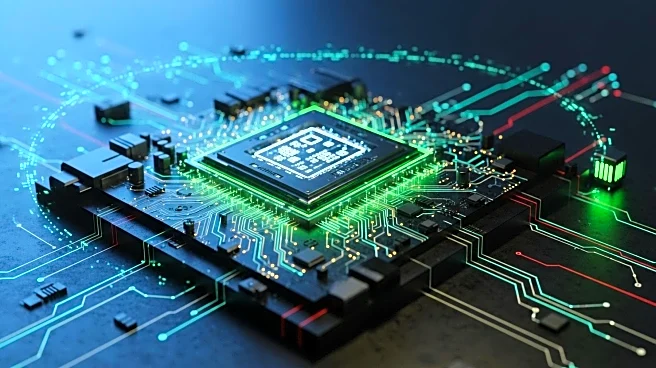What's Happening?
Intel has received a significant boost following a $5 billion investment from Nvidia, the world's leading chipmaker. This development comes after the U.S. government, under the Trump administration, invested $8.9 billion in Intel, stabilizing the company. The partnership between Nvidia and Intel aims to collaborate on new PC and data center chips, marking a strategic move in the semiconductor industry. This collaboration is part of a broader effort to enhance domestic semiconductor manufacturing capabilities in the U.S. The investment has led to a substantial increase in Intel's stock value, with shares experiencing their largest one-day jump since 1987. Nvidia's investment represents nearly 4% of Intel, highlighting the importance of this partnership in the context of the AI revolution and the need for advanced data center solutions.
Why It's Important?
The investment by Nvidia and the U.S. government in Intel underscores the strategic importance of domestic semiconductor manufacturing. This move is crucial for strengthening the U.S. supply chain and reducing reliance on foreign semiconductor production. The collaboration between two major industry players, Intel and Nvidia, is expected to drive innovation and competitiveness in the U.S. tech sector. It also reflects a broader industrial policy aimed at bolstering U.S. technological leadership and economic resilience. The partnership could lead to significant advancements in AI and data center technologies, benefiting various sectors reliant on these technologies. The investment also signals confidence in Intel's potential to regain its position as a leading chip manufacturer.
What's Next?
The partnership between Nvidia and Intel is likely to lead to the development of new technologies and products in the semiconductor industry. As the collaboration progresses, it may attract further investments and partnerships, enhancing the U.S. semiconductor ecosystem. The U.S. government may continue to support such initiatives to ensure technological leadership and economic security. Stakeholders, including tech companies and policymakers, will be closely monitoring the outcomes of this partnership to assess its impact on the industry and the broader economy.
Beyond the Headlines
This development highlights the geopolitical dimensions of semiconductor manufacturing, as countries strive for technological self-sufficiency. The U.S. government's involvement in supporting domestic chip production reflects a strategic shift towards securing critical supply chains. The partnership may also influence global semiconductor market dynamics, prompting other nations to bolster their own domestic capabilities. Additionally, the collaboration could lead to ethical and regulatory considerations regarding data privacy and security in AI and data center technologies.










